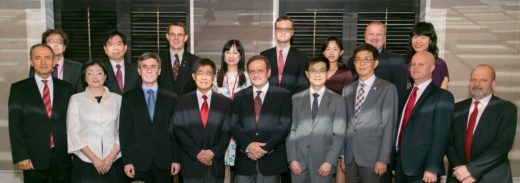European Experiences in Public-Private Partnership: the Key to Mitigate Climate Change

See more photos at ECCT FB
Date: Thursday, 26 June 2014
Venue: Residence One, Grand Hyatt TaipeiOn 26 June the ECCT Chairman and leading executives from ECCT firms who are members of the ECCT's Low Carbon Initiative (LCI), senior European government officials, environmental protection experts from Asia and Europe and local government officials enjoyed a networking lunch on the subject "European Experiences in Public-Private Partnership: The Key to Mitigate Climate Change" co-organized by Environmental Protection Administration (EPA), the ECCT and the European Economic and Trade Office (EETO). The lunch was held after a special workshop, the "2014 Workshop on Capacity Building of Regional Carbon Market in Asia: Experiences from Europe".
Venue: Residence One, Grand Hyatt TaipeiOn 26 June the ECCT Chairman and leading executives from ECCT firms who are members of the ECCT's Low Carbon Initiative (LCI), senior European government officials, environmental protection experts from Asia and Europe and local government officials enjoyed a networking lunch on the subject "European Experiences in Public-Private Partnership: The Key to Mitigate Climate Change" co-organized by Environmental Protection Administration (EPA), the ECCT and the European Economic and Trade Office (EETO). The lunch was held after a special workshop, the "2014 Workshop on Capacity Building of Regional Carbon Market in Asia: Experiences from Europe".
EPA Minister, Dr Wei Kuo-yen Wei, opened the event by thanking foreign speakers for their valuable contribution to the climate change workshop and said that he believed the discussions would lead to further cooperation in the future. In his remarks, the minister also said that he hopes to create partnerships between Taiwan and the international community to develop green industry technologies.
In his remarks at the lunch, ECCT Chairman Guiseppe Izzo (and concurrently a member of the LCI) said that he hoped that the workshop would spur real action in Taiwan to address the real and growing threat from climate change that is facing all of us. He also encouraged Taiwan to set more ambitious carbon reduction targets and take more action to boost low carbon industry initiatives across multiple industries. He reiterated a call made since the LCI was launched for more cooperation between the ECCT, the Taiwan government and Taiwanese corporations to take advantage of the proven technologies and sustainable solutions developed by European firms that could help to reduce Taiwan's carbon emissions across a wide range of industries.
In his remarks, Frederic Laplanche, Head of the European Economic and Trade Office (EETO), stressed that business development and the reduction of lower carbon emission are not mutually exclusive, citing the European Union as an example. Through the joint efforts, he noted that the European Union has successfully reached its goal of reducing carbon emissions by 80% while maintaining 40% of GDP growth over the past three decades.
The lunch featured two keynote speeches by Erdal Elver, President and CEO of Siemens Taiwan and Dr Joanna Lei, Chairperson of the Taipei Greenhouse Gas (GHG) Infrastructure Steering Association.
Emphasizing the importance of taking actions to combat global warming, Erdal Elver said that Taiwan has a lot of potential to forge public-private partnerships (PPPs), especially in projects related to the green economy. In his presentation Elver highlighted examples of the industry's ability to develop technologies to help reduce energy consumption. These included three PPP examples from LCI members. The Kaohsiung City's metro system, developed through cooperation between Siemens Taiwan and Kaohsiung City has helped to reduce emissions from private transportation. Two other PPP examples are Bosch's eMobility solution to support the electric vehicle (EV) charging infrastructure launched in Singapore, and Siemens' London Array project, conducted in collaboration with the UK government to build the world's biggest offshore wind farm. He added that his company would love to work with the Taiwan government to develop a low carbon future together.
Dr Joanna Lei, in her capacity as chairperson of Taipei GHG Infrastructure Steering Association, gave a perspective based on her background in sociology and anthropology, saying that too many people were still not aware of the dangers of climate change and the importance of reducing greenhouse gases. While advances in market-based instruments could be employed to help human beings to reach GHG reduction goals, she wondered whether market-driven schemes could be effective in reducing carbon emissions. She posed the question "Are we as humans just using all these incentives to incentivize existing industries and economies or should we think about market incentives to promote a low-carbon economy instead?"
Citing the speedy and widespread communication revolution as an example of how the public sector has offered incentives to the private sector to launch products, Dr Lei encouraged innovation in both the private and public sectors with consumers in mind, as their collective power could make significant changes that incentivize a total migration to a low carbon economy.
